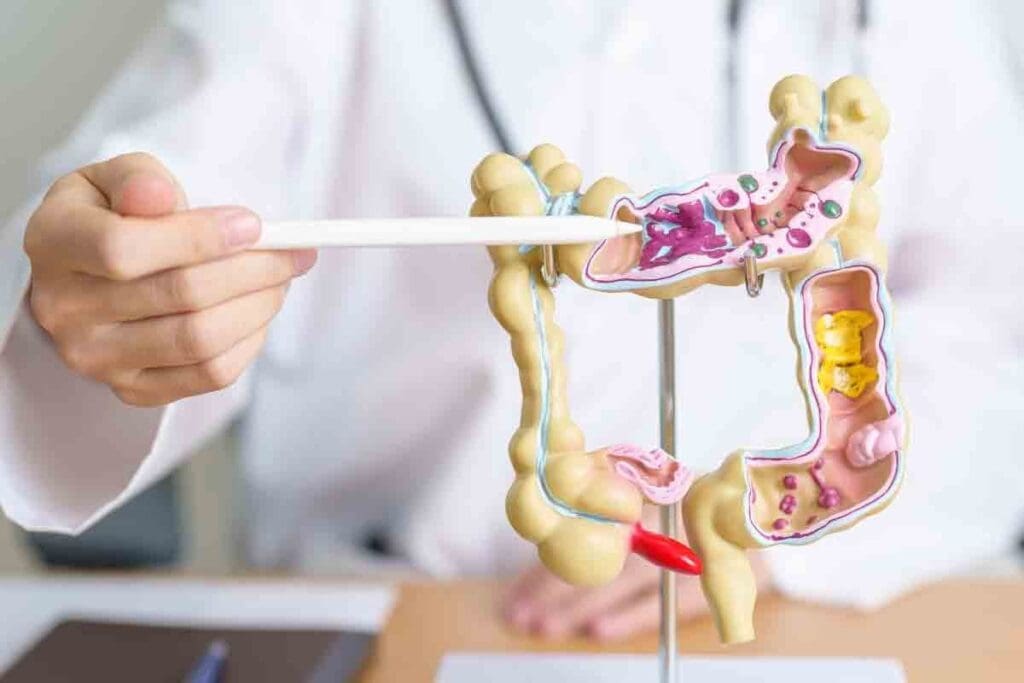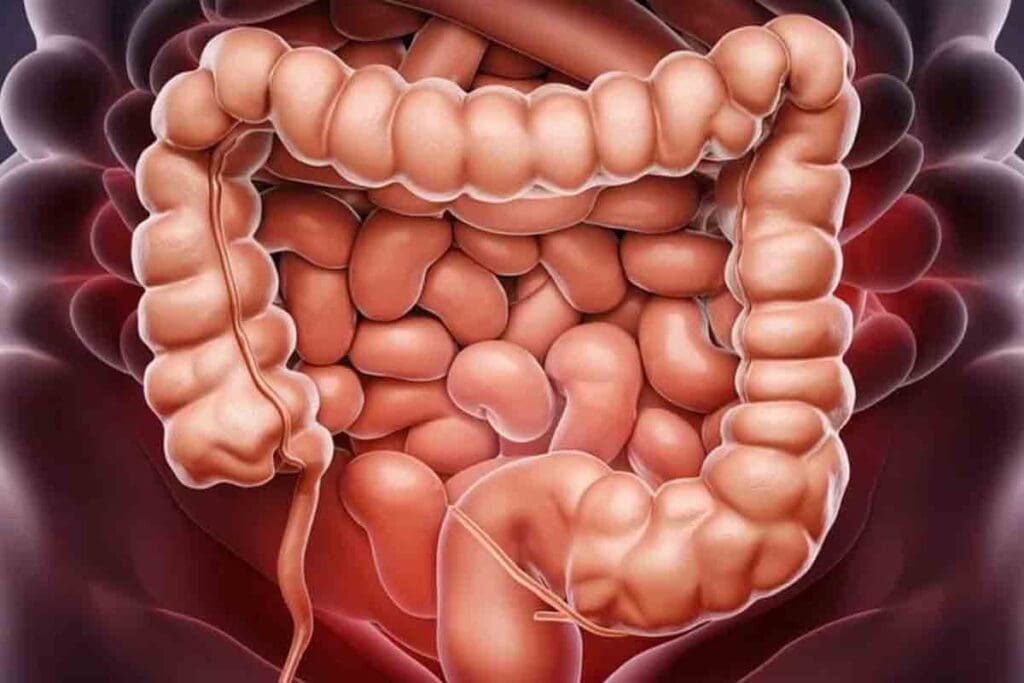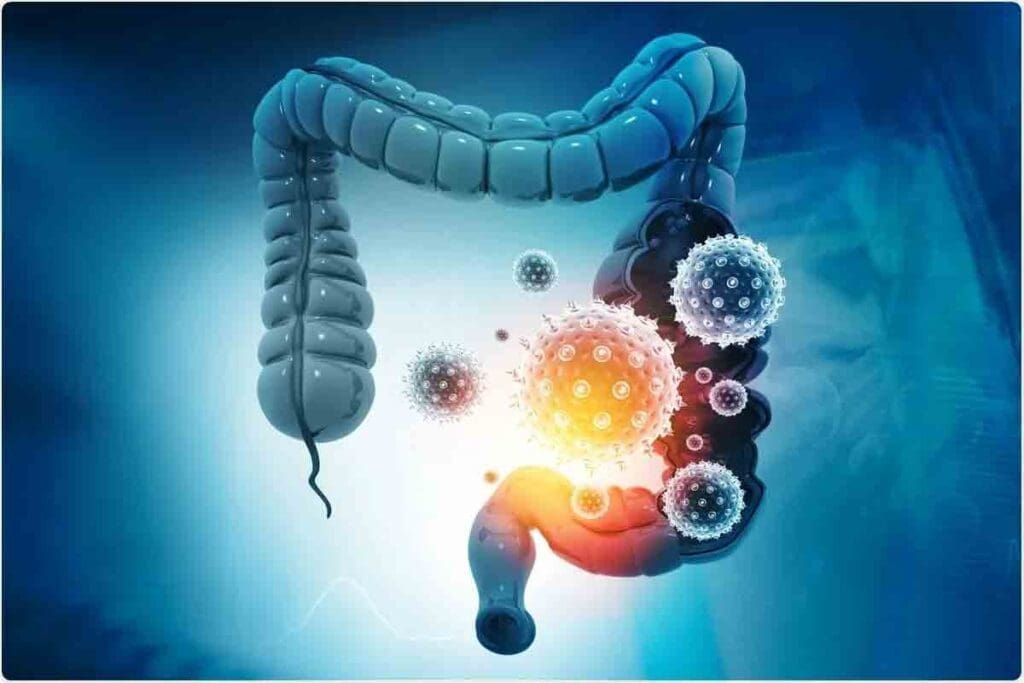Last Updated on November 26, 2025 by Bilal Hasdemir

Abdominal surgeries or inflammation can lead to bands of scar tissue between the colon and surrounding tissues. This is known as colon adhesions. These adhesions can greatly affect bowel health and might cause bowel obstruction.
If you or a loved one has unexplained abdominal discomfort or bowel issues after surgery, it’s important to know about colon adhesions. Liv Hospital offers trusted, patient-centered care for these complex conditions.

Colon adhesions, also known as bowel adhesions, are bands of fibrous tissue. They can connect the colon to other parts of the abdomen or to itself. These adhesions often happen after surgery, inflammation, or infections in the belly.
Adhesive tissue forms as a natural response to injury or inflammation. In the case of colon adhesions, this involves fibrin, a protein that acts like glue. Over time, this fibrin can turn into fibrous tissue, making the adhesion more permanent.
Several factors can influence adhesion formation. These include the extent of surgical trauma, the presence of infection or inflammation, and how quickly someone heals. Surgical procedures, which can cause significant tissue damage, are a major risk factor for adhesions.
Colon adhesions are quite common, mainly in people who have had abdominal surgery. Research shows that many patients who have had surgery will develop adhesions. But not all will show symptoms.
Adhesions can have a big impact on digestive health. They can cause bowel obstruction by blocking the normal movement of intestinal contents. They can also lead to chronic pain, digestive issues, and other problems. The severity of these symptoms can vary a lot among people.
Some adhesion formation is normal during healing. But pathological adhesions are those that cause serious problems. The main difference is in how much and where the adhesions form, and how they affect surrounding tissues and organ function.
Normal healing balances inflammation and repair. Pathological adhesions come from an imbalance or dysregulation of this process. Knowing this difference is key to diagnosing and managing colon adhesions well.

Colon adhesions are a major reason for bowel obstruction. This condition blocks the intestine, causing severe pain, vomiting, and constipation. Knowing about colon adhesions helps doctors diagnose and treat the problem effectively.
Adhesions cause about 1% of all surgeries and 3% of laparotomies. This is a big financial burden. Adhesion-related bowel obstruction is a common problem, affecting healthcare systems worldwide.
The frequency of adhesion-related bowel obstruction varies. It’s a major cause of illness. The condition can be acute or chronic, needing different treatments.
Colon adhesions limit the intestine’s movement. They can physically block it or twist it. This buildup of food, fluids, and gas causes bowel obstruction.
Adhesions form from surgery, inflammation, or infections. They stick the intestine to other parts, limiting its movement and function.
The restriction of intestinal movement can lead to severe complications if not addressed promptly.
Bowel obstruction from colon adhesions can be acute or chronic. Acute obstruction happens suddenly and severely, needing emergency care.
Chronic obstruction has symptoms that come and go or last a long time. It’s treated with medicine and surgery to manage symptoms and prevent problems.
It’s important for doctors to know the difference between acute and chronic obstruction. This helps them plan the right treatment.
Knowing what causes colon adhesions is key to preventing and treating them. These adhesions can cause serious problems. They are influenced by many factors, like medical history, surgery, and health conditions.
Surgeries, mainly in the abdominal area, often lead to colon adhesions. Prior abdominal surgery is a big reason for these adhesions in the West. Operations like open gynecologic and open colectomy surgeries can cause adhesions. The surgery trauma starts an inflammatory response, which can form adhesions.
After surgery, complications can make the adhesion risk worse. Infections, long-lasting inflammation, and tissue ischemia make adhesions more complex. It’s important for doctors and healthcare teams to know these risks to prevent them.
Inflammatory conditions like peritonitis in the abdominal cavity are big contributors to colon adhesions. Peritonitis is an inflammation of the peritoneum, caused by infection, chemical irritation, or other reasons. This inflammation can cause adhesions as the body tries to fight the inflammation.
The severity and how long the inflammation lasts can affect how likely and how much adhesions will form. Conditions that cause long-lasting or recurring inflammation are more likely to lead to adhesions.
Infections in the abdominal cavity can greatly affect the formation of colon adhesions. For example, bacterial peritonitis can cause severe inflammation and adhesions. The body’s fight against infection releases cytokines and inflammatory mediators, which can help form adhesions.
Having an infection can make healing harder, leading to more adhesions. It’s important to understand how infections contribute to adhesions to develop good prevention and treatment plans.
Radiation therapy, when aimed at the abdominal area, can change tissues in that area. Radiation-induced tissue damage can cause inflammation, fibrosis, and adhesions. The risk of adhesions after radiation therapy depends on the dose and how long the radiation lasts.
Patients getting radiation therapy should watch for signs of adhesions. Preventive steps should be taken to lower this risk. Knowing how radiation affects tissue health is key to managing its long-term effects.
Colon adhesions can show up in many ways, making it hard to diagnose them. Knowing the symptoms is key to getting help quickly.
People with adhesions often have chronic pain in their belly. This pain can stay the same or change. It might feel like it’s coming from one spot or spread out.
Adhesions can mess with digestion, leading to constipation and changes in bowel movements. This happens because the intestine gets partially blocked.
Nausea and vomiting are signs that something might be wrong. They could mean a bowel obstruction from adhesions in the colon. If not treated, it could get much worse.
Severe pain, vomiting, and constipation are signs of a serious problem. This is true if the adhesions are in the sigmoid colon. Getting medical help right away is very important to avoid more serious issues.
Knowing what colon adhesions are and their symptoms is important for treatment. Catching them early can make a big difference for those affected.
Colon adhesions are bands of fibrous tissue. They can form between loops of the intestine or between the intestine and other organs or the abdominal wall. This can cause bowel obstruction.
Adhesions in the bowel are often caused by surgical trauma. They can also be caused by inflammatory conditions like peritonitis, infections, and radiation therapy. These lead to the formation of scar tissue.
Adhesions can restrict normal intestinal movement. This can lead to bowel obstruction, chronic abdominal pain, and digestive disturbances. These issues can impact overall digestive health.
Adhesional bowel obstruction is a condition where adhesions cause a blockage in the intestine. This prevents normal flow of intestinal contents. It can lead to severe abdominal pain, nausea, vomiting, and constipation.
Yes, adhesions can cause chronic abdominal pain. They restrict intestinal movement and cause persistent discomfort or pain in the abdomen.
Colon adhesions are typically diagnosed through imaging tests. These include X-rays, CT scans, or MRI. These tests help identify adhesions and assess their impact on bowel function.
Symptoms of bowel obstruction caused by adhesions include severe abdominal pain, nausea, vomiting, constipation, and abdominal distension. These symptoms can indicate a medical emergency.
Yes, radiation therapy can cause colon adhesions. It leads to tissue changes and scarring in the irradiated area. This can result in adhesion formation.
Yes, colon adhesions are a common complication of abdominal surgery. Surgical trauma can lead to adhesion formation, which is more likely if there is significant tissue handling or damage during the procedure.
Adhesions differ from normal healing processes. They involve the formation of abnormal fibrous tissue that can cause complications. Normal healing involves restoring tissue integrity without excessive scarring.
Subscribe to our e-newsletter to stay informed about the latest innovations in the world of health and exclusive offers!